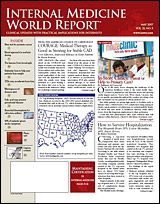Publication
Article
Internal Medicine World Report
Experts Question 4-Hour Antibiotic Use in Presumed Pneumonia
Ann Emerg Med
Researchers present new evidence that questions the wisdom of a core quality measure that requires emergency physicians to administer antibiotics within 4 hours to any patient with symptoms of community-acquired pneumonia (. 2007; 49:553-559).
The quality measure, known as PN-5b, was established by the Centers for Medicare & Medicaid Services (CMS) and the Joint Commission on Accreditation of Healthcare Organizations (JCAHO). The University HealthSystem Consortium has established a 90% rate of adherence to all JCAHO/ CMS core measures as a goal. This retrospective study looked at the feasibility of attaining this level of compliance with PN-5b.
Lead investigator Christopher Fee, MD, of the Department of Emergency Medicine at the University of California, San Francisco Medical Center, and colleagues studied a group of 152 adults who were treated in the emergency department in 2005 and who met the JCAHO/CMS eligibility criteria. Of these, 65.1% received antibiotics within 4 hours of arriving at the emergency department; among those who did not receive antibiotics within 4 hours (outliers), 58.5% did not have a final diagnosis of pneumonia. Among the outliers, only 43% had an abnormal chest x-ray, compared with 95% of those who received antibiotics within 4 hours.
Reasons for not administering antibiotics within 4 hours included physicians considering other diagnoses and the difficulties of providing timely care in routinely overcrowded facilities.
In an accompanying editorial, Jesse M. Pines, MD, MBA, of the Department of Emergency Medicine at the Hospital of the University of Pennsylvania, points out that it can be difficult to detect pneumonia in a subset of patients who cannot tell their physicians what is wrong with them, or who present with atypical symptoms. Dr Pines refers to the latter groups as having “occult pneumonia.”
“JCAHO and CMS should not expect the diagnosis of occult pneumonia to reasonably occur within 4 hours of arrival to the ED,” he states.
“There is a growing concern that to achieve an arbitrarily established performance standard on the antibiotic timing measure, as set by the Joint Commission and CMS, unnecessary antibiotics will be administered to patients who do not actually have pneumonia,” said Dr Fee. “This may needlessly expose patients to additional side effects and could be a contributing factor to growing antibiotic resistance in the population at large.”
Drs Fee and Pines recommend that JCAHO and CMS establish more attainable goals or limit the quality measure, so that it applies only to patients with objective evidence of pneumonia or when the disease is included in the final diagnosis.
“It may be that, despite our best efforts, patients who get late antibiotics just take longer to diagnose because of atypical presentations,” Dr Pines said. “This study reflects the real-life challenge of diagnosing pneumonia in the emergency department. Most emergency patients do not come in the door with a sign on their foreheads that reads, ‘I have pneumonia, give me antibiotics now.’”






